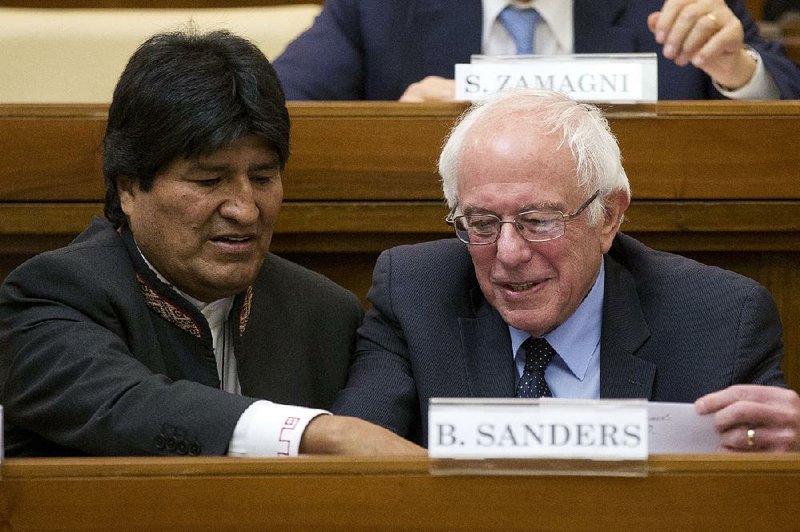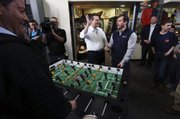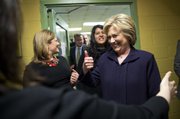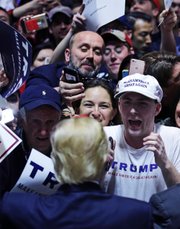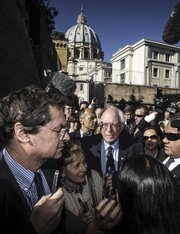VATICAN CITY -- Bernie Sanders issued a global call to action at the Vatican on Friday to address "immoral and unsustainable" wealth inequality and poverty, using the international gathering to echo one of the central platforms of his Democratic presidential campaign.
RELATED ARTICLE
http://www.arkansas…">50 donors keep super PACs fat
FULL ELECTION COVERAGE
The U.S. senator from Vermont cited Pope Francis and St. John Paul II repeatedly during his speech to the Vatican conference commemorating the 25th anniversary of a landmark teaching document from John Paul on social and economic justice after the Cold War.
Sanders arrived in Rome hours after wrapping up a debate in New York on Thursday night, saying the opportunity to address the Vatican conference was too meaningful to pass up. The roughly 24-hour visit precedes Tuesday's primaries in New York, which will award the largest pot of delegates so far in the Democratic race between Sanders and former Secretary of State Hillary Clinton.
Francis apologized in a note that he couldn't personally greet participants at the Vatican conference because of a planned trip to the Greek island of Lesbos. No meeting with Sanders was expected.
But the trip gave Sanders a moment on the world stage, placing him alongside priests, bishops, academics and two South American presidents. Sanders is seen as being at a disadvantage during his campaign against Clinton, President Barack Obama's former secretary of state, on foreign policy matters, but he was peppered with questions from academics and ecclesiastics.
The discussions gave him a chance to expand on his core campaign messages about the need to change banking regulations, campaign-finance rules and higher education. Asked about inequality in public education, he said it was "beyond disgraceful" and cited challenging conditions in Detroit's school system.
He told the audience during a 15-minute address that rather than a world economy that looks out for the common good, "we have been left with an economy operated for the top 1 percent, who get richer and richer as the working class, the young and the poor fall further and further behind."
"We don't choose to politicize the pope, but his spirit and courage and the fact, if I may say so here, that his words have gone way, way, way beyond the Catholic Church," Sanders told attendees.
Sanders also warned that youths around the world are no longer satisfied with the status quo, which includes "corrupt and broken politics and an economy of stark inequality and injustice."
"Pope Francis has given the most powerful name to the predicament of modern society," Sanders said. "He calls it the globalization of indifference."
The senator called for more compassion and said that he has seen hope and a sense of possibility in the young people he has encountered during his campaign.
"Some might feel that it is hopeless to fight the economic juggernaut, that once the market economy escaped the boundaries of morality it would be impossible to bring the economy back under the dictates of morality and the common good," he said. "Yet Pope Francis himself is surely the world's greatest demonstration against such a surrender to despair and cynicism. He has opened the eyes of the world once again to the claims of mercy, justice and the possibilities of a better world."
During the meetings, he sat next to the other main guest of honor at the Vatican: Bolivian President Evo Morales. President Rafael Correa of Ecuador also attended.
Soon after the speech, Sanders walked through Vatican City's Perugino gate and was greeted by about two dozen supporters, some of whom carried signs bearing Sanders' name.
"This is the first candidate I have seen in a while, a matter of fact my entire life, that I feel like wants to make real changes," said Kevin Jaksik, 29, of Austin, Texas, who now lives in Rome.
Sanders traveled to Rome with his wife, Jane, and their entourage did not stay in Italy long, flying back to New York shortly after his speech.
Back home, Clinton holds a significant delegate lead against Sanders, but the senator has vowed to stay in the campaign until the party's July convention. His message calling for a political revolution to address wealth inequality and the influence of Wall Street on U.S. politics has galvanized many Democrats and independents.
Despite being enmeshed in an increasingly bitter campaign against Clinton, Sanders aides said the trip was not aimed at appealing to Catholic voters, who make up a large share of the Democratic electorate in New York and a forthcoming contest in Pennsylvania.
The Vatican does not get involved in electoral campaigns and usually tries to avoid any perception of partisanship involving the pope. Popes rarely travel to countries during the thick of political campaigns, knowing a papal photo opportunity with a sitting head of state could be exploited for political ends.
The chancellor for the pontifical academy, Monsignor Marcelo Sanchez Sorondo, has said he invited Sanders because he was the only U.S. presidential candidate who showed deep interest in the teachings of Francis.
Separately, Sanders made good Friday night on a pledge to release his full tax returns from recent years, sharing a 2014 federal filing that showed income of just more than $200,000 and some gifts to charity.
He released the top pages of his 2014 federal and state returns in June, and the attached schedules did not include many new revelations, beyond a reported $8,350 in charitable contributions.
The vast majority of Sanders and his wife's income came from his $174,000 Senate salary and Social Security benefits that both he and his wife, a former college president, receive.
Sanders' tax returns have become a flash point in the race, with Clinton accusing him of being slow to share them with the public -- an accusation that was leveled in Thursday night's debate between the two in Brooklyn.
Jeff Weaver, Sanders' campaign manager, said the couple will release their 2015 returns, which will be filed Monday unless they seek an extension, shortly after the returns are finished.
RNC Scolds Trump
The remaining set of candidates, Democratic and Republican alike, entered the weekend with low-key events.
For the GOP, that meant focusing on the heated debate on delegate selection. After a week of criticism by front-runner Donald Trump, the Republican National Committee officials swung back, reminding him that rules for selecting convention delegates have been on the books since last fall.
The party's rebuke comes as Trump and his top aides have used interviews, campaign rallies and newspaper op-eds this week to criticize what transpired last weekend in Colorado, where state Republicans held a convention to select their 34 delegates to the Republican National Convention in July. U.S. Sen. Ted Cruz, R-Texas, swept the contest, and Trump failed to have any of his supporters win delegate slots.
"One million Republicans in Colorado were sidelined by the party's decision to hold a convention instead of a caucus or primary," Trump wrote in an op-ed published Friday by The Wall Street Journal.
Trump's sustained attacks on Republican leadership in recent days forced Republican National Committee Chairman Reince Priebus to lash out at the GOP front-runner earlier Friday.
"The truth is that these plans have been in place since October of last year. It's was the same system that elected Abraham Lincoln," Priebus said on NBC's Today. He continued, "The complaining that goes on is something that I think probably distracts from what we really need to do, which is come together as Republicans."
On Friday, RNC communications director Sean Spicer sent reporters a memo in the same vein: "For decades, this grassroots-driven, democratic process has been transparent and effective. This cycle is no different.
"The rules surrounding the delegate selection have been clearly laid out in every state and territory, and while each state is different, each process is easy to understand for those willing to learn it," Spicer said. "It ultimately falls on the campaigns to be up to speed on these delegate rules."
But Trump rained fresh criticism on the nomination process Friday night at a rally in Hartford, Conn., describing the system as "rigged" and warning that millions of disenfranchised Republicans would sit out the general election if he's denied the nomination.
Trump attacked his Republican rivals, Cruz and Ohio Gov. John Kasich, but also took direct aim at his own party's leadership. He claimed that "party bosses" arranged a presidential nomination process that has unfairly allowed Cruz to stay within striking distance in the battle for delegates.
"The system is rigged, folks," Trump said. "The top Republicans called up, they said, 'Donald, please could you stop saying that?' I said: 'Look, I'm telling the truth. I don't care, I'm telling the truth.'"
The back-and-forth comes just as the party heads into another busy period of delegate allocation and selection. This weekend, seven states will hold meetings to select at least some of their delegates to the Cleveland convention. Republicans will gather in Georgia, Kansas, Oklahoma, South Carolina and Virginia for meetings in congressional districts to award their delegates.
Through Friday afternoon, Trump leads the GOP race with 744 delegates. Ted Cruz has 545 and Kasich has 144. It takes 1,237 delegates to win the GOP nomination.
Fuss over Wyoming
In Wyoming, Republicans are hosting a convention similar to the one held in Colorado, and Trump is again set to lose to Cruz. Alan Cobb, a senior Trump adviser, said the businessman's campaign made a conscious decision not to commit resources to Wyoming.
Trump picked only up a single delegate in last month's Wyoming county conventions while Cruz scored nine. There are 14 more delegates at stake at this weekend's state convention. In a telephone interview from the convention site in Casper, Wyo., Cobb said Friday that he expects Cruz to sweep what remains of the 29 delegates up for grabs in the Wyoming convention.
"This process is favorable toward party-insider folks," Cobb said. "When you don't have a vote of the people, it just favors [Cruz]."
While Cruz's campaign has been working for months lining up support among Wyoming's GOP insiders, Trump's campaign has limited mobilization in the state, and the candidate has not spent any time campaigning there. Cruz is scheduled to attend today's convention.
Sarah Palin had been scheduled to speak for Trump in Casper today but canceled her appearance on Thursday. Cobb said he may wind up giving Trump's address.
The state party's system of allocating delegates through county meetings followed by the state convention doesn't favor the disorganized.
Trump encouraged supporters to demonstrate against the Colorado party's presidential nominating process Friday at the state capitol in Denver.
"The very insider, narrow pathways like Wyoming, they just don't work very well for us," Cobb said. "Campaigns make strategic choices on where to go and where to invest, and just given your process here, it just doesn't lend itself to our kind of campaign and candidate."
With resources diverted from Wyoming, Trump's campaign instead focused on the much larger prize in New York, where he has the home state advantage over Cruz and Kasich.
On Friday, Trump picked an endorsement from the New York Post's editorial board.
"Trump is now an imperfect messenger carrying a vital message," the editorial board wrote. "But he reflects the best of 'New York values' -- and offers the best hope for all Americans who rightly feel betrayed by the political class."
Information for this article was contributed by Ken Thomas, Nicole Winfield, Rachel Zoll, Ben Neary and Steve Peoples of The Associated Press; by Yamiche Alcindor of The New York Times; and by Ed O'Keefe, Justin Wm. Moyer and John Wagner of The Washington Post.
A Section on 04/16/2016
